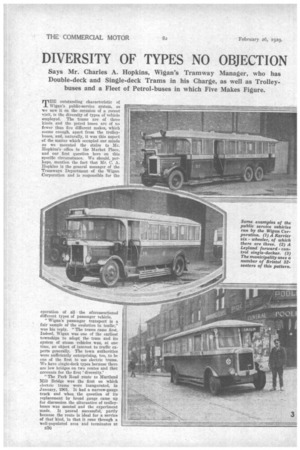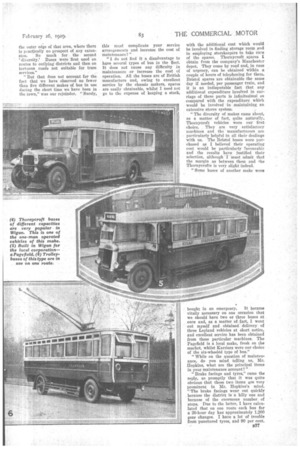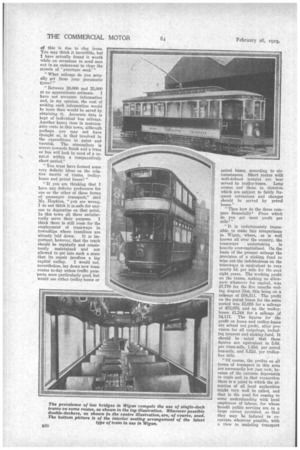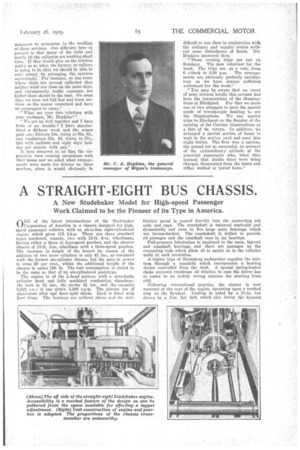DIVERSITY OF TYPES NO OBJECTION
Page 62

Page 63

Page 64

Page 65

If you've noticed an error in this article please click here to report it so we can fix it.
Says Mr. Charles A. Hopkins, Wigan's Tramway Manager, who has Double-deck and Single-deck Trams in his Charge, as well as Trolleybuses and a Fleet of Petrol-buses in which Five Makes Figure.
TEW outstanding characteristic of Wigan's public-service system, as we saw it on the occasion of a recent visit, is the diversity of types of vehicle employed. The trams are of three kinds and the petrol buses are of no fewer than five different makes, which seems enough, apart from the trolleybuses, and, naturally, it was this aspect of the matter which occupied our minds as we mounted the stairs to Mr. Elopkins's office in the Market Place. and our first question bore on this specific circumstance. We should, perhaps, mention the fact that Mr. C. A. Hopkins is the general manager of the Tramways Department of the Wigan Corporation and is responsible for the
operation of all the aforementioned different types of passenger vehicle.
" Wigan's passenger transport is a fair sample of the evolution in traffic," was his reply. " The trams came first. Indeed, Wigan was one of the earliest townships to adopt the tram and its system of steam vehicles was, at one time, an object of interest to traffic experts generally. The town authorities were sufficiently enterprising, too, to be one of the first to use electric trams. We have single-deck types because there are low bridges on two routes and that accounts for the first 'diversity.'
"The Park Road route to Martland Mill Bridge was the first on which electric trams were inaugurated, in January, 1901. It had a narrow-gauge track and when the question of its replacement by broad gauge came up for discussion the alternative of trolleybuses was mooted and the experiment made. It proved successful, partly because the route is ideal for a service of that kind, in that it runs through a well-populated area and terminates at B36 the outer edge of that area, where there is practically no prospect of any extensiou. So much for the second 'diversity.' Buses were first used on routes to outlying districts and then on tortuous roads not suitable for tram services," "But that does not account for the fact that we have observed no fewer than five different makes of bus in use during the short time we have been in the town," was our rejoinder. " Surely, this must complicate your service arrangements and increase the cost of maintenance?"
"I do not find it a disadvantage to have several types of bus in the fleet. It does not cause any difficulty in maintenance •or increase the cost of operation. All the buses are of British manufacture and, owing to excellent service by the chassis makers, spares are easily obtainable, whilst I need not go to the expense of keeping a stock,
with the additional cost which would be involved in finding storage room and in employing storekeepers to take care of the spares. Thoreycroft spares I obtain from the company's Manchester depot. They come by road and in case of urgency, can be obtained within a couple of hours of telephoning for them. Bristol spares are obtainable the same day if needed, per passenger train, and it is an indisputable fact that any additional expenditure involved in carriage of these parts is infinitesimal as compared with the expenditure which would be involved in maintaining an extensive stores system.
"The diversity of makes came about, as a matter of fact, quite naturally. Thornycroft vehicles were our first choice. They are very satisfactory machines and the manufacturers are particularly helpful-in all their dealings with us. The Bristol buses were purchased as I believed their operating cost would be particularly favourable and the results have justified their selection, although I must admit that the margin as between them and the Thorn ycrofts is very slight indeed.
" Some buses of another make were bought in an emergency. It became vitally necessary on one occasion that we should have two or three buses at once and, as a matter of. fact, I went out myself and obtained delivery of three Leyland vehicles at short notice, and excellent service has been obtained from these particular machines. The Pagefield is a local make, fresh on the market, whilst Karriers were our choice of the six-wheeldd type of bus."
"While on the question of maintenance, do you mind telling us, Mr. Hopkins, what are the principal items in your maintenance account?"
"Brake facings and tyres," came the reply, so promptly that it was quite obvious that these two items are very prominent in Mr. Hopkins's mind. "The brake facings wear out quickly
• because the district is a hilly one and because of the enormous number of stops. Due to the latter, I have calculated that on one route each bus for a 20-hour day has approximately 1,200 gear changes. I have a lot of trouble from punctured tyres, and 90 per cent.
of this is due to clog irons. 'You may think it incredible, but I have actually found it worth while on occasions to send men out in an endeavour to clear the streets of ' puncture seed.'" "What mileage do you actually get from your pneumatic tyres? "
"Between 20,000 and 25,000 at an approximate estimate. I have not accurate information and, in my opinion, the cost of seeking such information would be more than would be saved by obtaining it. Accurate data is kept of individual bus mileage. Another heavy item in maintenance costs in this town, although perhaps you may not have thought so is that involved in the expenditure in paint and varnish. The atmosphere is severe towards finish and a tram or bus will look in need of a repaiat within a comparatively short period."
"You must have formed some very definite ideas on the relative merits of trams, trolleybuses and petrol buses?"
"If you are thinking that I have any definite preference for one or the other of these forms of passenger transport," said Mr. Hopkins, "you are wrong. I do not think it is,safe for anyone to dogmatize on that point. In this town all three satisfac torily serve their purpose. I think there is still room for the employment of tramways in townships where tramlines are
already laid down. It is important, however, that the track should be regularly and consistently maintained and not allowed to get into such a state that its repair involves a big
capital outlay. I would not, nevertheless, lay down new tram routes to-day unless traffic prospects were particularly good, but would use either trolley-buses or Petrol buses, according to circumstances. Short routes with well-defined termini are best served by trolley-buses. Long routes and those in districts which are subject to fairly frequent extensions and changes should be served by petrol buses."
"Then how do the three compare financially? From which do you get most profit per mile 2 "
" It is unfortunately impossible to make fair comparisons in Wigan, where, as is well known all over the country, the tramways undertaking is heavily over-capitalized. On the basis of the present mileage the grovision of a sinking fund to wipe out the indebtedness on the tramways is equivalent to very nearly 5(1. per mile for the next eight years. The working profit on the trams, making no allowance whatever for Capital, was £7,770 for the five months ending August 31st, this being on a mileage of 508,311. The profit on the petrol buses for the same period was £3,025 for a mileage of 472,076, and on the trolley
buses £1,244 for a mileage of•54,117. . The figures for the
profit on buses and trolley-buses are actual net profit, after provision for all outgoings, including interest and sinking fund. It should be noted that these figures are equivalent to 3.6d. Per tram-mile, 1.55d. per petrol bus-mile, and 5.52d. per trolleyboa mile.
"Of course, the profits on all forms of transport in this area are necessarily low just now, because of the extreme depression in trade and in that connection there is a point to which the attention of all local authorities might very well be called, and that is the need for coming to some understanding with local employers of labour, for whose benefit public services are .to a large extent provided, so that they may be induced to . cooperate wherever possible, with a view to assisting transport
managers to economize in the working of those services. Our difficulty here at -. .present is that many of the mills and nearly all the collieries are working eho.rt time. If they Would give us the briefest notice, as to when the factory, or colliery Is 'going: to be slint.we ShOuld be able to . saVe money by arranging. the services accoldingly. For instance, on one route. Where there are Several collieries: they neither work -liar close on the same days, and consequently traffic . expenses are higher than should be the case. On some days we turn' cnit full' bus. and tramservices on the routes concerned and have no passengers to carry."
"What are your own relations with your workmen, Mr. Hopkins?"
" We get on well together and I have little or no trouble:41 I have standardized a 48-hour week and the wages paid are.: Drivers 58s. rising to 61s. 6d., and conductors 53s. 6d. .rising to 57s., this with .uniform and eight days' holiday per annum with pay."
It here occurred to us that the corporation runs evening excursions. with their buses and we asked what arrangements were made for drivers on those services, since it would obviously be difficult to run them in conjunction with the ordinary and regular routes without some disturbance of hours. Mr. Hopkins answered thus.
• " These evening trips are run on Sundays. The men volunteer for the work. The trips are, as a rule; from
6 o'clock to 9.30 p.m. The arrangements are obviously perfectly satisfactory as we have always sufficient volunteers for the work."
" You may be aware that an event of some interest locally this autumn has been the inauguration of the -illuminations at Blackpool. For that we made one or two attempts to meet the special needs of townspeople desiring to see the illuminations. We ran special trips to Blackpool on the Sunday of the opening of the October illuminations at a fare of 4s. return. In addition, we arranged a special service of buses to wait in the station yard and meet late night trains. The first was a success, the second not so successful, on account of the extraordinary attitude of the potential passengers who, when they learned that double fares were being charged, dismounted from the buses and either walked or taxied home."




















































































































